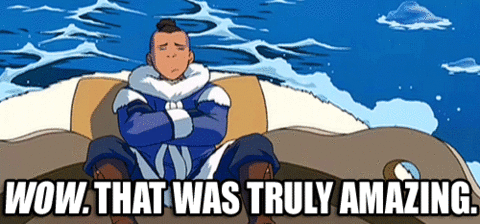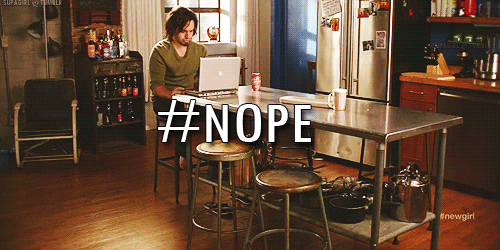 |
| Me, in real life. |
This is, not surprisingly, something that comes in conflict with my writing. I find my novels work out best when I can settle into a writing environment and not escape for two or three hours; it lets me get into the flow of my story, my world and my characters and get it all out. This does not happen nearly as much as I'd like. What generally happens is I sit down, open my laptop, check out ten AskReddit threads, write 200 words, watch five YouTube videos, write 300 words, chat with some friends, write 100 words, watch an episode of Survivor or Chopped or whatever tickles my fancy, write 50 words, and go to work. This is miles away from my productive ideal, and when I succumb to my brain's impulse to bounce around every little thing and not stick to my zone, I get choppy and borderline incoherent writing. Heck, before I started writing this post, I read three articles, which led to a full album on YouTube and a dalliance on Twitter.
Luckily for me, I am not defenseless against my brain. I've got a few things that I can do to help myself and stay on target. I'm not going to pretend they come with a 100% effectiveness guarantee, but they do come with a higher success rate than twiddling my thumbs and expecting the literary goddesses to bless me with laser-sharp, fighter pilot-esque focus. I'm not ShamWow Guy here.
 |
| HOW COULD ANYONE NOT WIN WITH THIS METHOD????? |
- Block out all the distractions. I'm not talking about a meditative breathing exercise wherein you only focus on your writing and use your inner forces to let the surrounding chaos drip away like a melting candle far off in the horizon. I'm talking far more literally here. Block your favourite websites, block your internet, and block your friends. On my Mac, I use a wonderful program called SelfControl, which allows you to blacklist a bunch of websites for a time span ranging from 15 minutes to 24 hours. Once you set your timer, those websites cannot be accessed, even if you delete the program. My current blacklist includes about 15 websites, and it expands every time I sit down to write and find a new tangent.
The downside: if I had a nickel for every time I missed an invitation to a social gathering because of my SelfControl timer... - Get comfortable, but not too comfortable. I cover a lot of this in my post on where to write, but I'll reiterate: if you find a good writing location, hold onto it until it goes blue from the amount of pressure you're putting on its windpipe.
A corollary to this one... - Music helps. Your music doesn't have to reflect the mood of the story, but it doesn't hurt. More important to me is that good music occupies one of my senses. If my headphones are in, my ears aren't searching for something around my laptop to distract me with. My favourite bands generally depend on the story I'm writing. For my current work in progress, I'm finding that Infected Mushroom, an Israeli psytrance band, is getting me in the right frame of mind.

It doesn't hurt that Infected Mushroom has the most amazing album covers. - Start with small goals and grow big. Yesterday, I wanted to complete one of Mónica Bustamante Wagner's voice development exercises from the maddening perspective of Donald Trump. One of my writing buddies was working on another piece for a friend. She hit 967 words. I thought 967 words was reasonable, so I vowed to match her. Those 967 turned into a goal of 1500, which turned into a goal of 2500, which turned into my final word count of just over 3300. By giving myself things that were easy to reach, I could shut off that feeling of discouragement and plug forward into meeting them. I tricked my brain into focusing for 15-30 minute chunks, which stack on top of each other into a 2-3 hour chunkpocalypse. I'm not the fastest writer in the first place (I've got bad fine motor skills too!) so this helps stop things from seeming too insurmountable.
Adding onto this... - Make your goals public. If I want to get 500 words before I go to bed, I announce it in my Skype writing group. If I want to write for 15 straight minutes, I tell my friend. That way, if I don't do it right away, or wander over to Facebook, I have my friends to hold me to my stated goals. More recently, I've decided to start tweeting out my daily word count, inspired by fellow writers Dylann Crush (give her a follow) and Drew Magary (a Deadspin/GQ writer who has tweeted his weight out daily before). Accountability, whether real or imagined, overrides the "nah, you totally need to check out the pattern on this tissue box" part of my brain. And, for anyone checking this post out: my goal is to write at least 2,000 words every day. If I do not meet that goal, you are welcome to ask me what the fuck happened.
This all leads to the last thing that undeniably keeps me on track. - If you magically, somehow, some way find The Zone, turn into a sea urchin and protect that beautiful slice of heaven for however long you can. I can become irrationally prickly if people try to intrude on me while my writing was working. If someone tries to open up a dialogue with me while I'm swimming in my main character's voice, I will reject them faster than Dikembe Mutombo in his prime (sports reference!) and keep my area clear. I have confused and irritated friends and family with my vehemence. Is it the best social move for me? Probably not. Does it ensure that I don't lose my precious moments of crystal clear focus, the next of which may not come along for 48 hours? Hell yes. And when you're writing and working, preserving that time is paramount...especially if you have the attention skills of a squirrel on crystal meth, and your fingers move at a speed that would make only a sloth jealous.
I'm not going to pretend my methods work all the time for everyone. Heck, I'm not going to even pretend that they work all the time for me. I planned on finishing this post before I went to work. Now, I'm heading home from work on the Taipei MRT, and I'm still banging out the last few sentences. When you're sparring with your own attention span, you can't just nuke it and say that you've won the war. But when you have issues focusing, you need to do all you can to throw yourself out of "space brain" and into "writing brain," and hope that today isn't the day that a really spectacularly coiffed Golden Retriever walks into your cafe.
 |
| Hahahaha, that dog looks like a tiger! Wait, was I writing something? |



















